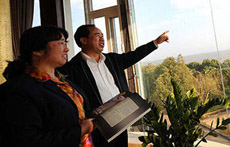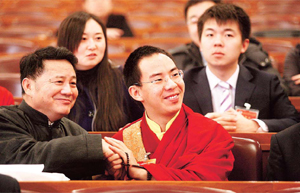Global media speak positively about China sessions
(Xinhua)
Updated: 2010-03-13 15:58
BEIJING - China's ongoing annual session of the National People's Congress (NPC) and the annual session of the Chinese People's Political Consultative Conference (CPPCC), which ended Saturday morning, have grabbed a lot of world attention.
Many overseas media outlets covered China's bid to change its growth pattern, its efforts for fairer national income distribution and other key topics.
In a government work report on March 5 to the NPC session, Chinese Premier Wen Jiabao said China expected its economy to grow around 8 percent in 2010 from a year earlier.
China is shifting its focus from "made in China" to "created in China" or "creative innovation" by underlining the importance of the growth pattern, South Korean daily Dong-a Ilbo observed.
"We urgently need to transform the pattern of economic development," the Associated Press (AP) quoted Wen as saying.
The Chinese premier promised more steps to boost domestic consumer spending and the creation of a high-tech industry to reduce reliance on exports and investment to drive growth, said the AP.
China has to cut back on its reliance on overseas markets if it wants stable growth, said Takashi Sekiyama, a researcher at the Policy Research Division of the Tokyo Foundation.
China has to transform its growth mode and shift its focus to domestic demand, industrial structure, innovation capacity, urbanization and a low-carbon economy, he said.
Experts and media outlets around the world agreed that improving people's livelihood is one of the "hot topics" at the NPC and the CPPCC sessions.
Richard Baum, former director of the Center for Chinese Studies at the University of California, Los Angeles (UCLA), said China's policy to "put people first" is a noble idea. It is a major step forward for China to have realized its importance and to have made efforts to turn it into a policy, he added.
The German newspaper Junge Welt (Young World) stressed that Wen's announcement to reform the nearly 60-year-old household registration system will ensure that the "peasant-workers" no longer suffer discrimination during their migration from countryside to urban areas.
BBC Chinese director Li Wen said the Chinese government now listens to public opinions and attaches great importance to people's livelihood in the policy-making process.
In his view, to improve people's livelihood, the Chinese government could use institutional measures to change the governing philosophy and ideas of the officials.
If the government uses the improvement of people's livelihood as a key indicator for assessing officials' job performance, there will be a better guarantee for solving problems as such, he added.
In the annual government work report, Wen said that "We will not only make the pie of social wealth bigger by developing the economy, but also distribute it well on the basis of a rational income distribution system."
Major media in France, including the news agency AFP, said that last year, the focus of the Chinese government was on economic growth, but the priority for this year is social development to meet people's needs.
A draft amendment to the electoral law tabled at the annual NPC session was also at the center of attention this year.
The draft amendment seeks to grant equal representation to the country's legislatures at all levels, ensuring equal representation among people, regions and ethnic groups.
The draft stipulates both rural and urban areas adopt the same ratio of deputies to the represented population in elections to people's congress deputies, China's fundamental political system.
South Korea's Joong Ang Daily said in an article that if the amendment was adopted, it would mean great democratic progress.
The NPC, China's top legislative body, started its annual session on March 5 and will close on Sunday. China's top political advisory body, the CPPCC, opened its annual session on March 3.






